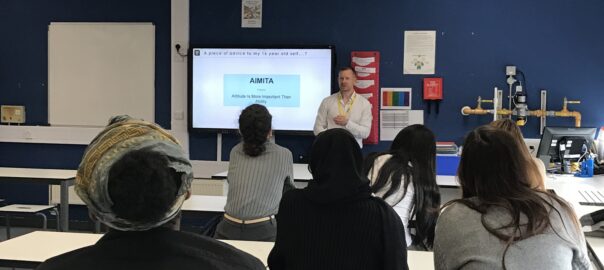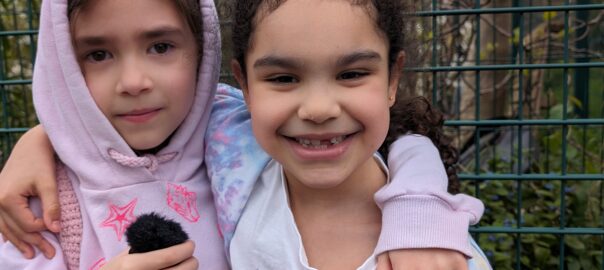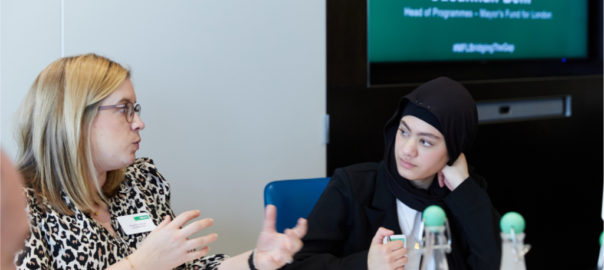In conversation with… Fisayo Fadahunsi

The theme for Black History Month this year has been ‘Saluting Our Sisters’. Through a series of conversations, we are proud to highlight and platform four inspirational Black women who are creating a lasting impact in their communities, on generations of young people and their families. The interviews explore their personal experiences, inspirations, and motivations, and reflect on why Black History Month is so important.
Today, we spoke to Fisayo Fadahunsi, Founder and Managing Director of Filmanthropy, an organisation that runs food and fun programmes for children and young people as well as using media as a tool for social good by co-creating content with local communities.
Can you tell us about your personal connection to Black History Month and what it means to you as a Black woman in London?
As a Black woman who was born and bred in London, Black history and culture is my every day, however, Black History Month is a great opportunity for all communities to learn and celebrate the contributions that Black people have made to society in a curated way. Black people have always existed in London’s history, yet it isn’t standard practice to recognise these contributions in our day-to-day lives. There tends to be quite an American-centric view of Blackness in what has been taught and celebrated in recent history, so Black History Month in London is an opportunity to acknowledge Black British experiences and presence.
I am also passionate about the importance of this recognition for children and young people, as much of what we understand about ourselves is rooted in our understanding of the past. By understanding Black history, children are more likely to have a sense of ownership, belonging and purpose which they can carry into their adult life.
Who are some Black women in British history who have inspired you and why?
I have usually shied away from role models as I am hyper-conscious that no significant event or shift in our history is the work of one individual, it is always the sum of a team effort. I remember a conversation I had with my mum when I was younger where she told me about the people who worked with Nelson Mandela and spent time in prison alongside him but are not recognised and remembered in the same way. Omission like this is common throughout history.
That being said, I do admire, learn from and lean on a lot of people in my surroundings. Due to the way that society is structured and the impact that it has on Black women, a lot of the people at the forefront of grassroots work and making change happen tend to be Black women. These women responding to issues in their communities inspire me because they show me that we have the power to make change happen through the strength of community.
What quote keeps you going?
I love quotes, and I have so many that it is hard to choose from, but two quotes that I use in my work are “Curiosity is the first step towards freedom or change…” and “Nobody is free until everyone is free…” by Fannie Lou Hamer. I think we all have the power to contribute to positive social change, and there are so many different mediums by which we can do this, it just requires critical thinking and being an active citizen.
On a more personal level, I remind myself of the quote “Rest is a form of resistance…” by Tricia Hersey. I think in the context of being a Black woman, resting is a way of reclaiming power over yourself and a reminder that you are enough as you are.
How can those who aren’t of Black heritage become active allies?
For me this is quite simple, the first step is just to recognise the humanity in the people around you. Once you recognise the humanity in another, despite differences, allyship can become almost natural. The other important part of it is in the word ‘active’ – make it a part of your everyday and acknowledge how your own actions might be perpetuating injustice both locally and globally. Try to focus on action rather than over intellectualising it and worrying about getting everything right. Language is definitely important, however, if you are acting within your community, you are more likely to have an impact on society and Black people’s experiences than if you are using the correct terminology.
Committing to being an ally means committing to knowing that it might involve a form of what feels like loss, but if you’re acknowledging that that comes from a place of privilege, and you act from a place of humanity then you’re ultimately contributing to creating true equity.
What is your go-to meal when cooking for others? What makes it so special for you?
I wouldn’t call myself a natural cook, but I love the process of cooking and for me, food and eating are all about community. When I went to university, I asked all my family to contribute to a recipe book that I took with me. The book contains things like my favourite recipes from my culture, which is West African, such as Jollof rice, Puff Puff, or some of our stews and soups as well other simple recipes like ‘the best jacket potato in the world’. This book represents the duality of my culture, it’s a reflection of my family and friends. The sense of community in food is what motivates me when I’m cooking.
As we mark the end of Black History Month ‘Saluting Our Sisters’ this year, what message or legacy would you like to leave for future generations of Black women in London?
It would just be a message of freedom. Freedom to be who you are, to celebrate who you are and to find a community in people that gives you a sense of belonging and ownership. A privilege of being a White person is that you can walk into a room and just be acknowledged as a person, whereas if a Black person walks into a room the first thing that everyone knows about them is their Blackness, which often comes with lots of preconceptions and assumptions. So it can often feel like you are representing your whole race. But it’s important to try and feel free of that when you need to and sisterhood is a big part of that journey because sisters will always be there for you to lean on, so you can be there as a sister to support others too.
To find out more, visit: filmanthropy.co.uk



